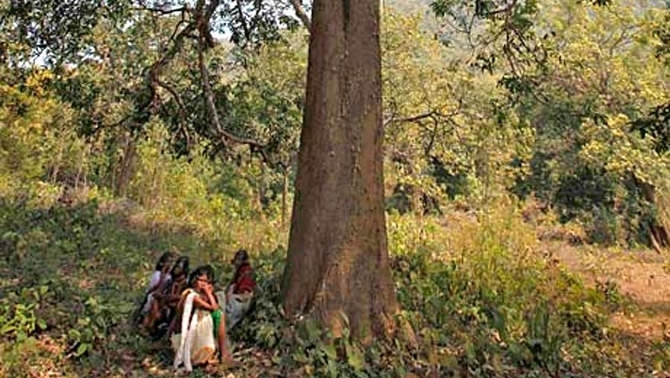
Tech & Sci
17:17, 27-Mar-2018
Conservationists slam India's plan for commercial plantations in forests
CGTN

Campaigners in India have criticized a proposed new policy for managing the country’s forests, saying it could undermine the rights of indigenous people to use them.
The draft proposal, unveiled earlier this month, suggests allowing plantations of “commercially important species” such as teak, eucalyptus and bamboo in forest lands.
That could open the door for private firms to grow and harvest commercial plantations, which would hurt the ecology and deprive tribal communities of their livelihoods, analysts said.
“This draft policy presents a very regressive and narrow vision of forest governance and management,” said Tushar Dash of the advocacy group Community Forest Rights.
“It raises serious concerns about the impact of monoculture plantations on bio-diversity and the local ecology, as well as displacements and violations of the rights of tribal and forest-dwelling communities,” he told the Thomson Reuters Foundation.
India has pledged to keep a third of its total land area under forest and tree cover, but a growing population and increasing demand for industrial projects are placing greater stress on these lands.
Under the 2006 Forest Rights Act (FRA), at least 150 million people could have their rights recognized to about 40 million hectares (154,400 sq miles) of forest land.
But progress has been slow, and campaigners say many states have rejected recognition of community rights.
The draft Forest Policy seeks to amend a three-decade-old law “by incorporating elements of ecosystem security, climate change mitigation, participatory forest management (and) robust monitoring,” the environment ministry said.
Public-private partnerships will undertake planting commercially important tree species in forest lands and in degraded forest areas, it said, referring to lands with less than 40 percent tree cover.
The draft undermines a 1996 law that gives indigenous people the right to govern their lands, as well as the FRA, which gives tribal people the right to inhabit and live off forests where their forefathers settled, Dash said.
Dash and other campaigners are demanding the speedy implementation of FRA, and the repeal of a law enacted in 2016 to increase forest cover by planting trees.
Activists say the 2016 law has encouraged officials to cut down natural forests, replacing them with valuable commercial teak and eucalyptus plantations for sale, thereby denying access to indigenous communities.
A more viable alternative would be to work with tribal people to improve productivity of native species, and encourage farmers to grow more trees with their crops, said Soujanya Shrivastav at the think tank Centre for Science and Environment.
“That will safeguard indigenous people’s livelihoods and boost farmers’ incomes, as well,” he said.
The draft proposal is open for public feedback till April 14.
Source(s): Reuters

SITEMAP
Copyright © 2018 CGTN. Beijing ICP prepared NO.16065310-3
Copyright © 2018 CGTN. Beijing ICP prepared NO.16065310-3